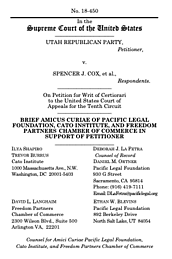Learn more about Cato’s Amicus Briefs Program.
In March 2014, a new law reformed Utah’s primary process by altering how candidates are nominated and how political parties are classified. As a result, candidates can get on the primary election ballot by gathering the required number of petition signatures, obtaining a nomination through the party’s convention, or both. Candidates who collect enough signatures can become the nominee without participating in the political party’s convention or gaining its nomination through the convention process.
The Utah Republican Party (“URP”) challenged the law as a violation of the party’s freedom of association under the First Amendment. Political parties, URP argues, have the right to choose a candidate-selection process that produces a nominee who best reflects the party’s political platform. The Tenth Circuit rejected URP’s claims, however, holding that the state’s interest in managing and regulating elections outweighed URP’s right of association.
URP has asked the Supreme Court to review its case, and Cato has joined the Pacific Legal Foundation, and Freedom Partners Chamber of Commerce in filing an amicus brief supporting the URP’s petition. We argue that the Court should grant review to resolve the tension between political autonomy and state control of elections. While the state has a compelling interest to ensure reasonable and nondiscriminatory elections, the Utah State Legislature has inappropriately interfered to change the type of nominee who wins URP’s primary. The law was passed to increase the likelihood that the party nominates more “moderate” candidates, but a state cannot use a supposedly unbiased procedural reform to compel a political party to select a nominee who is not fully in line with the party’s views.
We also argue that the Court needs to explicitly establish group-specific rights. Voluntary associations play a vital role in liberal democracy and are a natural and necessary outgrowth of the individual freedoms guaranteed by the Constitution. Groups have features that individuals do not, including by-laws, hierarchy, membership requirements, and decision-making procedures. Therefore, ensuring that individuals within a group retain their rights to associate and express themselves does not always suffice to protect the group from undue government interference. A group’s decision-making procedures help define the group’s identity and purpose, and Utah’s law was designed to limit the URP’s ideological diversity. The Court has a chance to establish that a group’s associational rights are different than individual members’ rights and therefore require a separate analysis.

This work is licensed under a Creative Commons Attribution-NonCommercial-ShareAlike 4.0 International License.
